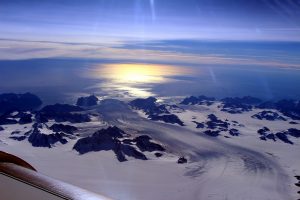
The recent heat wave that baked both Europe and North America also had a major impact on the world’s largest island: temperatures across Greenland spiked during the same time period, causing a major melt event that released 18 billion tons of water over a three-day period, enough to cover the entirety of the state of West Virginia in a foot of water.
Over the weekend between July 15 and 17 an unusually warm air mass combined with a high-pressure dome over northern Greenland, sending temperatures—already 5°C (10°F) above normal this year—even higher, causing an “unusually extensive melt event” across 45 percent of the island’s massive ice sheets, as described by Ted Scambos, a senior research scientist at the University of Colorado’s Earth Science and Observation Center and National Snow and Ice Data Center.
“It definitely worries me,” remarks Kutalmis Savlam, a research scientist with the University of Texas-Austin. “We are at 67 [degrees] latitude here on top of the world [at the] north pole, and we could just yesterday… we could wander around in our t-shirts. That was not really expected.”
This melt event caused Greenland’s ice sheets to shed an estimated 18 billion tons of water over that weekend—that’s 6 billion tons per day—enough to “cover West Virginia in a foot of water—4 inches per day, roughly,” according to Scambos. This heat wave even extended as far into Greenland’s interior as the East Greenland Ice-core Project (EastGRIP): even at an elevation of 9,000 feet (2,740 meters) near the middle of the ice sheet the temperature rose to -1.6°C (29°F), warm enough to soften the snow on top of the station’s skiway, making the surface of the typically-frozen runway too soft for the cargo planes to safely land on, forcing the science team to postpone shipping their latest batch of ice cores back to the mainland.
“This event is one of many events over the whole summer,” Scambos adds. “We can expect on the order of 100 billion tons of water going into the ocean. Greenland as a whole is losing a tremendous amount of ice every year now.” 2019 was a record year for ice melt for Greenland, shedding roughly 532 billion tons of ice over the course of the year, hiking sea levels permanently by 1.5 millimeters that year alone; it is estimated that Greenland has enough ice to raise sea levels by 7.5 meters (24.6 feet) if the entire ice sheet were to melt.
Prior to the effects of global warming, Greenland would receive roughly 600 billion tons of snowfall each year and lose about 300 billion from ice melt; now, the world’s second largest ice mass “is losing nearly 300 gigatons of water each year more than it gains from snowfall,” according to William Lipscomb , a senior scientist at the National Center for Atmospheric Research’s Climate and Global Dynamics Laboratory.
“There’s still time to avoid catastrophic sea level rise, but every year that greenhouse gas emissions continue at the present rate increases the chances of serious problems down the road.”
Subscribers, to watch the subscriber version of the video, first log in then click on Dreamland Subscriber-Only Video Podcast link.
This is such a disastrous event , mankind isn’t taking heed of nature’s warnings .
That people are more interested in shallow , instant gratification than the welfare of humanities future generations baffles me.
The freshening of the Atlantic will stop or slow the tropical Conveyor Belt, that brings warm waters Northward and keeps Europe warm…when that fails the cold air will come charging down and we may be in another ice age sooner than expected.
An yet we still drive our Victorian era internal combustion machines fueled by oil & gas and spewed Co2.
DUMB!
The shutdown is supposedly still a ways off. In fact the melting would have to get 10x worse according to some predictions. My worry is the predictions have repeatedly been too conservative on their time scales, so who knows? The other thing is our current warming probably wouldn’t allow for the past type ice ages. The oceans are too warm.
We are in uncharted waters. I’m pretty sure what we are doing has never occurred on planet earth before. To clarify, yes the earth has warmed in the past…repeatedly. What hasn’t happened is our combustion of fossil fuels on top of the natural cycles.
Yes Stan you are right, the predictions are off, way off! I find it ridiculous that they want predict what will happen in 2050 when no one predicted the thousands of animal and human deaths due to excessive heat this year. I believe we have arrived at a point where we cannot accurately determine the impact these events are having on our world, especially when they are happening one after the other.